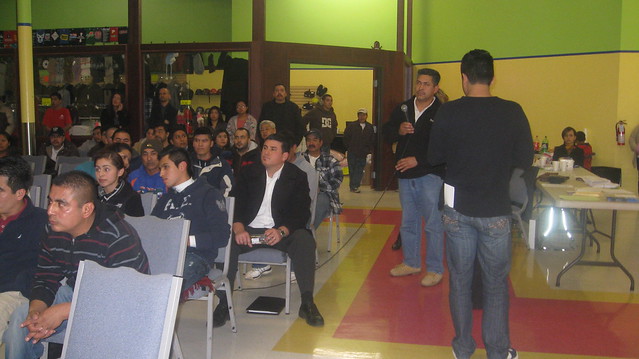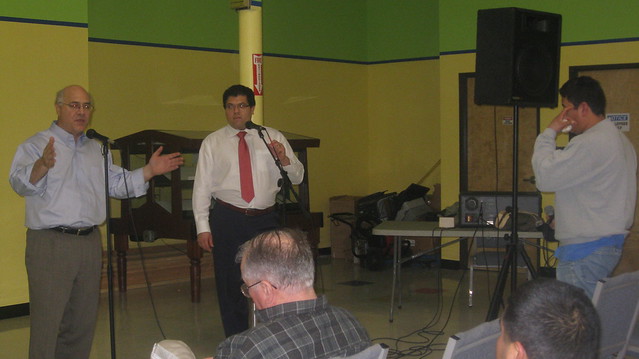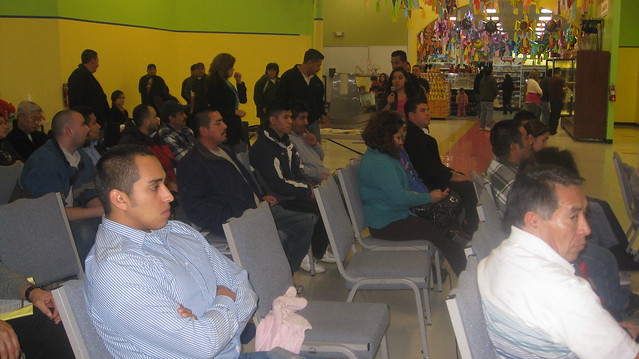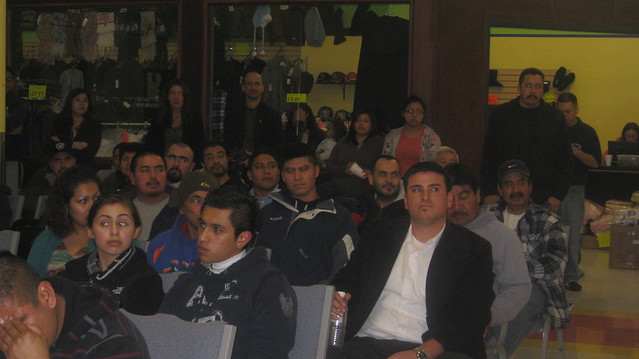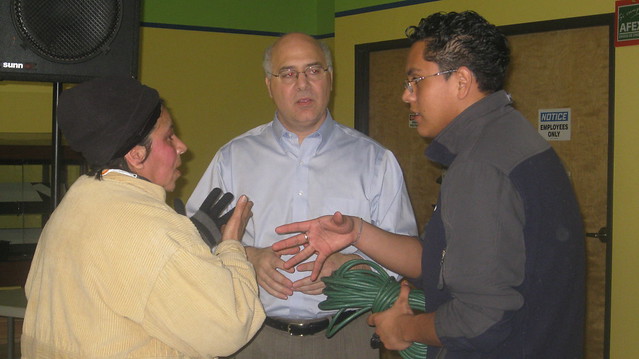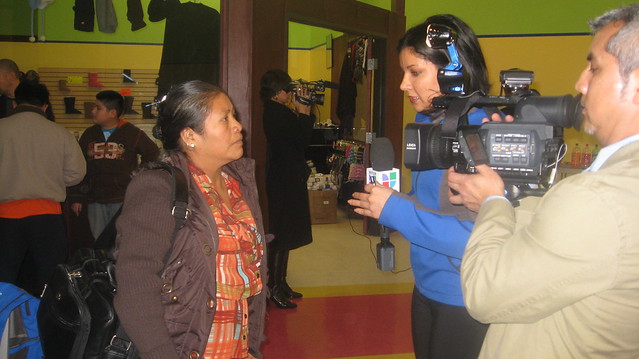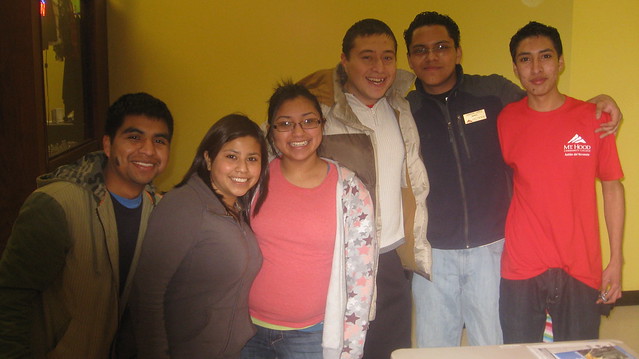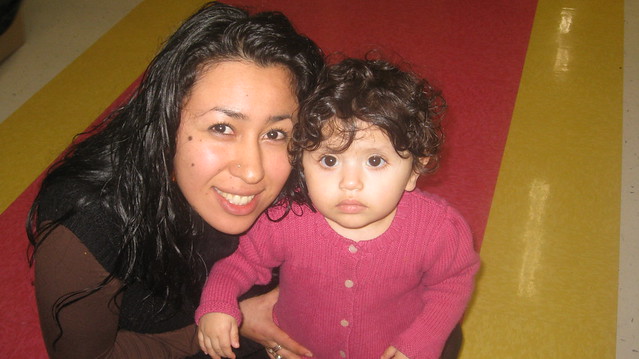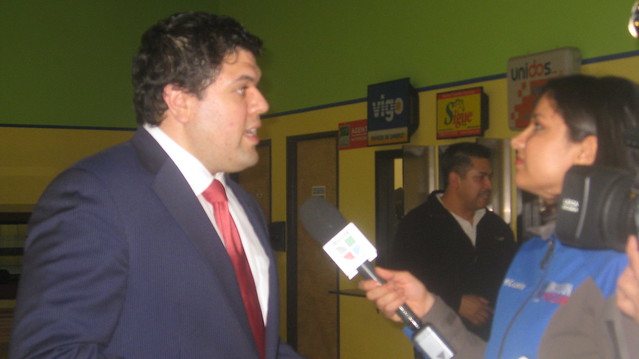OCHA Labor & Employment Forum with Labor Commissioner Brad Avakian
“I’ve lived and worked 44 years in the U.S., and sent two sons off to American universities, but the respect we get from Oregon employers, sadly, is sometimes hostile, often being treated indifferently because of the color of our skin.” - participant
At the core of my public service work on the Oregon Commission on Hispanic Affairs is having a pulse of the Chicano/Latino community. I was disturbed to hear through my friends over at Univision KUNP-TV the challenges facing Oregonian Latino workers which led me to ask more questions, and ultimately ask our Labor Commissioner Brad Avakian if he and his bilingual staff would join me to have a meaningful conversation and respond to questions from local workers.
On January 28, 2010, huddled inside a Mexican grocery store & panaderia in Gresham, Oregon, Labor Commissioner Brad Avakian and I hosted a Labor & Employment Forum to educate Oregonian workers of their rights as workers, the work of the Bureau of Labor and Industries (BOLI) and most importantly to listen to concerns from the Latino community. Interestingly, it began with a conversation I was having with Roxy De La Torre and Delia Hernandez over at KUNP-TV Univision regarding Latino workers not being paid. In their role as journalists they would receive calls and emails from workers who had performed work but were not being paid, workers who often didn’t know their rights, and workers who sent their requests over to BOLI but were being denied a claim. I became curious, and asked Commissioner Brad Avakian if he and his bilingual staff would join me at a community forum in Gresham to discuss and respond to these concerns, which he happily agreed to. Oregon Labor Commissioner Avakian leads BOLI and is one of six statewide-elected officials. He’s the person responsible for ensuring that, “when you work a days work, you get paid.”
A few takeaways from the community forum: BOLI receives and processes thousands of claims annually, but not all are awarded. Workers should document who they are going to work for at all times, including but not limited to business name, owner/contractor, address, phone, location of work, hours of work, etc. It doesn’t matter if you are a citizen of the United States of America, everyone who works has the right to get paid at least the minimum wage for hours worked. Document the license number of person who writes you a check in the case the check cannot be paid. From the Q&A w/ Commissioner Brad Avakian:
Q: What is your agency doing so that construction company’s treat us equally with full benefits, not as sub-contractors. A: We need to know when this happens. They need to pay you as an employee. Please let us know so we can help. We legally have the power to demand them to pay you.
Q: Is it illegal for companies to treat you as a sub-contractor? A: If you are an employee, yes.
Q: I worked for a construction company for 3 months and I haven’t been paid. What do I do? A: That’s illegal, they have to pay you. You need to file a claim. Companies have to pay you whether they have money or not. But, if they are in bankruptcy, there are funds to help companies in crisis.
Q: Why don’t I get a pay stub but I get taxes taken from my check? A: That’s a problem, let us help.
Q: Why do companies do this? What is BOLI doing to stop this? A: We need to know they are doing this in order to help. Employers have to pay at least the minimum wage ($8.40 p/hr), not just pay you.
Q: What are the rights when people get sick on the job? A: When a person gets injured at work don’t go to BOLI, go to Workers Compensation. There’s a a way to get medical treatment and wages payed when you get hurt. If your employer fires you, then you got to see BOLI. Just remember this: call BOLI for any questions and we will direct you to the appropriate agency.
Q: What info is needed to win a case? A: The more info you can give us, the better, i.e. any info that is given to you by your employer that specifies hours and wages you were told you were going to be paid, witnesses and other co-workers contact information.
Q: How long do I have to file a claim with BOLI? A: A person has to file a claim with BOLI within a year after being unfairly fired.
Q: Is it illegal to not get a pay stub? A pay raise? A: It’s not illegal to not get raises. Keep records of how many hours you are working in case they are not paying you so you can get your wages. Yes, you are entitled to your pay stub.
In the Nov 2009 Health Care Reform & Latino Health Care Disparities Forum, I used a combination of Spanish-TV, radio and print marketing (2,500 flyers) and the event attracted upwards of 60+ individuals. In the Labor & Employment Forum, I dropped the print marketing and focused my attention on producing a 30-second commercial (disclaimer: sponsored by Tienda La Tapatia & El Rey 93.1FM) and did interviews on KUNP-TV Univision, La Gran D, and Radio Tonalli. The results were as expected. Non-stop calls of individuals RSPVing to the forum.
Heartfelt thanks to Commissioner Avakian and his bilingual staff for their participation. Special thanks to Milan Homola of Clear Creek Community Church for letting us borrow chairs; Obie Quiroz and MEChA at Mt. Hood Community College for setting up chairs/tables, take-down and manning the registration table; Alvaro Gongora of Reynolds School District for his a/v equipment set-up and expertise.
Special thanks to El Hispanic News y Más, AlegreTV and KUNP-TV Univision for their special news coverage.
And, finally, Mauricio Alvarez of Tienda La Tapatia for his generous hospitality and sponsorship.
Originally posted on Posterous and LatinoPoliticsBlog
Commissioner David Molina serves on the Oregon Commission on Hispanic Affairs, an eleven-member statewide commission with statutory authority that advises the governors’ office and legislative body on all policy issues pertaining to Oregon’s largest and fastest-growing ethnic community, Latinos. Appointed by Governor Ted Kulongoski in April 2006, he was recently reappointed to a second three-year term.
